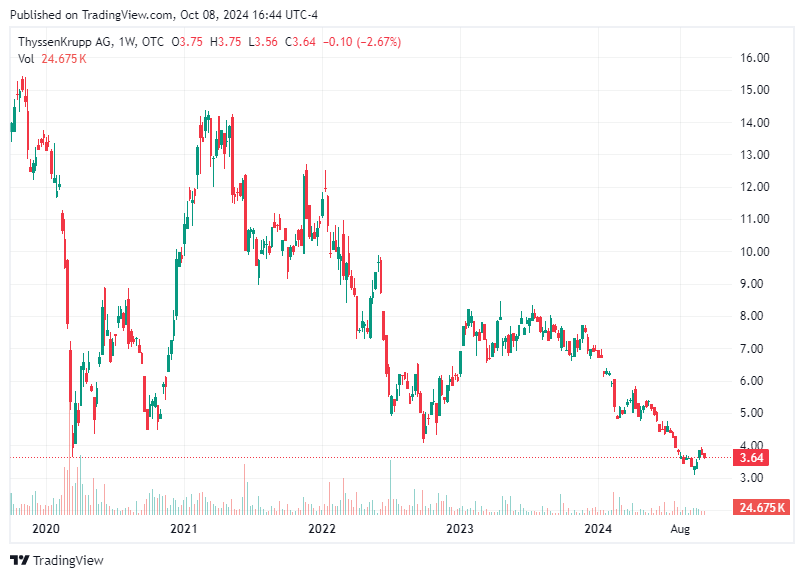German Industrial Conglomerate Announces Steel Decarbonization Project
Thyssenkrupp's Green Steel Plan Under Review: A Comprehensive Analysis.

Disclaimer: This article is intended for informational purposes only and should not be construed as financial advice. Readers are advised to conduct their own research or consult with a professional financial advisor for specific guidance.
Thyssenkrupp, the renowned German industrial conglomerate, has found itself at the center of intense scrutiny and debate following its decision to reassess its ambitious plan to produce "green steel." This move, driven by escalating costs and complex market dynamics, has had notable consequences not only for the company but also for the broader steel industry. This article aims to delve deep into the various facets of Thyssenkrupp's decision, examining the reasons behind the review, its financial outcomes, the potential effects on stakeholders, and the overall context of the steel industry in today's rapidly evolving economic landscape.
Understanding the Green Steel Initiative
At the heart of Thyssenkrupp's approach was its plan to transition towards climate-neutral steel production at its Duisburg facility, one of the largest steel production sites in Europe. The initiative involved the development of a direct reduction plant (DRI) that would utilize hydrogen instead of coal to reduce iron ore, thereby significantly cutting carbon emissions. This transition was not only crucial for Thyssenkrupp's environmental commitments but also aligned with broader global efforts to combat climate change.
The project, originally slated to commence operations by 2027, was expected to set a benchmark for sustainable industrial practices. Both the federal government of Germany and the state of North Rhine-Westphalia had pledged substantial financial support, amounting to €2 billion, to facilitate this green transformation. However, despite the promising outlook, recent developments have cast doubt on the project's feasibility.
The decision to review the green steel project was primarily triggered by the steel division's warnings that the costs associated with implementing the plan could surpass initial projections. Internal documents reportedly indicate that Thyssenkrupp's senior management, including CEO Miguel Lopez, are engaged in a fundamental reassessment of the DRI project. The potential cost increases have sparked concerns about the financial viability of the initiative, prompting a reevaluation of the project's timeline and scope.
The global steel market has been undergoing significant shifts, characterized by heightened competition from Asian producers and fluctuating demand in Europe. These market dynamics have placed additional pressure on Thyssenkrupp's steel unit, necessitating a reexamination of its priorities.
Financial Outcomes
The financial outcomes of Thyssenkrupp's decision are multifaceted. Firstly, the company risks having to repay a portion of the substantial state subsidies it has already received if the project is ultimately canceled. This repayment obligation could strain the company's financial resources and exacerbate existing challenges.
Thyssenkrupp has been grappling with disappointing financial results, as evidenced by its recent reports of declining net income and profits, coupled with rising operating expenses. The review of the green steel project adds another layer of complexity to the company's financial landscape, potentially affecting investor confidence and market performance. The company's shares have already experienced volatility, with a reported drop of nearly 5% following the announcement of the project review. This decline reflects investor concerns about the uncertainty surrounding Thyssenkrupp's future direction and its ability to navigate the challenges posed by the evolving steel market.
The review of the green steel initiative carries substantial effects for a wide array of stakeholders. For Thyssenkrupp's employees, particularly those involved in the steel division, the uncertainty surrounding the project's future raises concerns about job security and potential restructuring efforts. The recent management reorganization within the steel unit, brought about by resignations and new appointments, further highlights the volatility within the company.
For the German government, which has positioned itself as a strong advocate for sustainable industrial practices, the reevaluation of Thyssenkrupp's project represents a setback in its quest to drive the green transformation of traditional industries. The government's financial commitment to the initiative underscores its importance in achieving national climate goals and maintaining Germany's leadership in sustainable innovation.
The review has effects for the broader steel industry, particularly in Europe. Thyssenkrupp's decision could influence other steel producers' approaches to green transformation, as companies closely monitor the outcomes of the review to inform their own decisions.
The Steel Industry
The challenges faced by Thyssenkrupp are indicative of broader trends and disruptions within the global steel industry. The industry is currently navigating a complex landscape characterized by several key factors:
Environmental Regulations: Increasingly stringent environmental regulations worldwide are compelling steel producers to adopt greener technologies and processes. This transition, while necessary, involves substantial financial investments and operational adjustments.
Economic Pressures: The steel industry is grappling with economic pressures stemming from fluctuating demand, price volatility, and competition from low-cost producers in Asia. These factors have heightened the urgency for efficiency improvements and cost management.
Technological Advancements: Advances in technology are reshaping steel production processes, offering both opportunities and challenges. Companies are exploring innovative solutions, such as hydrogen-based reduction and carbon capture technologies, to enhance sustainability and competitiveness.
Global Supply Chain Dynamics: Recent geopolitical developments and disruptions in global supply chains have further complicated the operating environment for steel producers. Companies must navigate supply chain complexities while ensuring compliance with international trade policies.
Thyssenkrupp's decision to review its green steel plan highlights the complexities and uncertainties inherent in the pursuit of sustainable industrial practices. While the initiative holds promise for reducing carbon emissions and aligning with global climate goals, its implementation poses substantial financial and operational challenges. As Thyssenkrupp navigates this pivotal moment, its approach will likely serve as a benchmark for other industry players grappling with similar dilemmas.
The outcome of the review will have far-reaching consequences for Thyssenkrupp, its stakeholders, and the steel industry as a whole. As the company continues to assess its strategy, it must balance financial prudence with its commitment to sustainability, all while navigating an increasingly competitive and dynamic market landscape.
Disclaimer: This article is intended for informational purposes only and should not be construed as financial advice. Readers are advised to conduct their own research or consult with a professional financial advisor for specific guidance.
We are working endlessly to provide free insights on the stock market every day, and greatly appreciate those who are paid members supporting the development of the Stock Region mobile application. Stock Region offers daily stock and option signals, watchlists, earnings reports, technical and fundamental analysis reports, virtual meetings, learning opportunities, analyst upgrades and downgrades, catalyst reports, in-person events, and access to our private network of investors for paid members as an addition to being an early investor in Stock Region. We recommend all readers to urgently activate their membership before reaching full member capacity (500) to be eligible for the upcoming revenue distribution program. Memberships now available at https://stockregion.net


